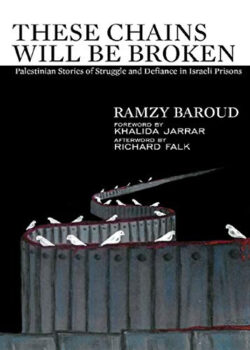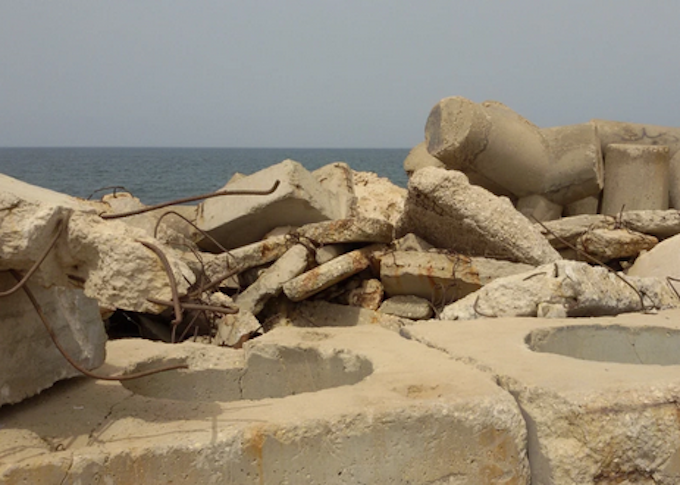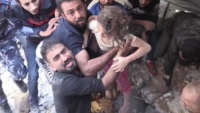 On May 25, famous American actor, Mark Ruffalo, tweeted an apology for suggesting that Israel is committing ‘genocide’ in Gaza.
On May 25, famous American actor, Mark Ruffalo, tweeted an apology for suggesting that Israel is committing ‘genocide’ in Gaza.
“I have reflected and wanted to apologize for posts during the recent Israel/Hamas fighting that suggested Israel is committing ‘genocide’,” Ruffalo wrote, adding, “It’s not accurate, it’s inflammatory, disrespectful and is being used to justify anti-Semitism, here and abroad. Now is the time to avoid hyperbole.”
But were Ruffalo’s earlier assessments, indeed, “not accurate, inflammatory and disrespectful”? And does equating Israel’s war on besieged, impoverished Gaza with genocide fit into the classification of ‘hyperbole’?
To avoid pointless social media spats, one only needs to reference the ‘United Nations Convention on the Prevention and Punishment of the Crime of Genocide’. According to Article 2 of the 1948 Convention, the legal definition of genocide is:
“Any of the following acts committed with intent to destroy, in whole or in part, a national, ethnical, racial or religious group, such as (a) Killing members of the group; (b) Causing serious bodily or mental harm to members of the group; (c) Deliberately inflicting on the group conditions of life calculated to bring about its physical destruction in whole or in part …”
In its depiction of Israel’s latest war on Gaza, the Geneva-based human rights group, Euro-Med Monitor, reported:
The Israeli forces directly targeted 31 extended families. In 21 cases, the homes of these families were bombed while their residents were inside. These raids resulted in the killing of 98 civilians, including 44 children and 28 women. Among the victims were a man and his wife and children, mothers and their children, or child siblings. There were seven mothers who were killed along with four or three of their children. The bombing of these homes and buildings came without any warning despite the Israeli forces’ knowledge that civilians were inside.
As of May 28, 254 Palestinians in Gaza were killed and 1,948 were wounded in the latest 11-day Israeli onslaught, according to the Palestinian Ministry of Health. Though tragic, this number is relatively small compared with the casualties of previous wars. For example, in the 51-day Israeli war on Gaza in the summer of 2014, over 2,200 Palestinians were killed and over 17,000 were wounded. Similarly, entire families, like the 21-member Abu Jame family in Khan Younis, also perished. Is this not genocide? The same logic can be applied to the killing of over 300 unarmed protesters at the fence separating besieged Gaza from Israel between March 2018 and December 2019. Moreover, the besiegement and utter isolation of over 2 million Palestinians in Gaza since 2006-07, which has resulted in numerous tragedies, is an act of collective punishment that also deserves the designation of genocide.
One does not need to be a legal expert to identify the many elements of genocide in Israel’s violent behavior, let alone language, against Palestinians. There is a clear, undeniable relationship between Israel’s violent political discourse and equally violent action on the ground. Potentially Israel’s next prime minister, Naftali Bennett, who has served the role of Defense Minister, had, in July 2013, stated: “I’ve killed lots of Arabs in my life – and there’s no problem with that.”
With this context in mind, and regardless of why Ruffalo found it necessary to back-track on his moral position, Israel is an unrepentent human rights violator that continues to carry out an active policy of genocide and ethnic cleansing against the native, indigenous inhabitants of Palestine.
Language matters, and in this particular ‘conflict’, it matters most, because Israel has, for long, managed to escape any accountability for its actions, due to its success in misrepresenting facts, and the overall truth about itself. Thanks to its many allies and supporters in mainstream media and academia, Tel Aviv has rebranded itself from being a military occupier and an apartheid regime to an ‘oasis of democracy’, in fact, ‘the only democracy in the Middle East’.
This article will not attempt to challenge the entirety of the misconstrued mainstream media’s depiction of Israel. Volumes are required for that, and Israeli Professor Ilan Pappé’s ‘Ten Myths about Israel’ is an important starting point. However, this article will attempt to present some basic definitions that must enter the Palestine-Israel lexicon, as a prerequisite to developing a fairer understanding of what is happening on the ground.
A Military Occupation – Not a ‘Conflict’
Quite often, mainstream Western media refers to the situation in Palestine and Israel as a ‘conflict’, and to the various specific elements of this so-called conflict as a ‘dispute’. For example, the ‘Palestinian-Israeli conflict’ and the ‘disputed city of East Jerusalem’.
What should be an obvious truth is that besieged, occupied people do not engage in a ‘conflict’ with their occupiers. Moreover, a ‘dispute’ happens when two parties have equally compelling claims to any issue. When Palestinan families of East Jerusalem are being forced out of their homes which are, in turn, handed over to Jewish extremists, there is no ‘dispute’ involved. The extremists are thieves and the Palestinians are victims. This is not a matter of opinion. The international community itself says so.
‘Conflict’ is a generic term. Aside from absolving the aggressor – in this case, Israel – it leaves all matters open for interpretation. Since American audiences are indoctrinated to love Israel and hate Arabs and Muslims, siding with Israel in its ‘conflict’ with the latter becomes the only rational option.
Israel has sustained a military occupation of 22% of the total size of historic Palestine since June 1967. The remainder of the Palestinian homeland was already usurped, using extreme violence, state-sanctioned apartheid, and, as Pappé puts it, ‘incremental genocide’ decades earlier.
From the perspective of international law, the term ‘military occupation’, ‘occupied East Jerusalem’, ‘illegal Jewish settlements’ and so forth, have never been ‘disputed’. They are simply facts, even if Washington has decided to ignore international law, and even if mainstream US media has chosen to manipulate the terminology as to present Israel as a victim, not the aggressor.
‘Process’ without ‘Peace’
The term ‘peace process’ was coined by American diplomats decades ago. It was put to use throughout the mid and late 1970s when, then-US Secretary of State, Henry Kissinger, labored to broker a deal between Egypt and Israel in the hope of fragmenting the Arab political front and, eventually, sidelining Cairo entirely from the ‘Arab-Israeli conflict’.
Kissinger’s logic proved vital for Israel as the ‘process’ did not aim at achieving justice according to fixed criteria that has been delineated by the United Nations for years. There was no frame of reference any more. If any existed, it was Washington’s political priorities which, historically, almost entirely overlapped with Israel’s priorities. Despite the obvious American bias, the US bestowed upon itself the undeserving title of ‘the honest peace broker’.
This approach was used successfully in the write-up to the Camp David Accords in 1978. One of the Accords’ greatest achievements is that the so-called ‘Arab-Israeli conflict’ was replaced with the so-called ‘Palestinian-Israeli conflict’.
Now, tried and true, the ‘peace process’ was used again in 1993, resulting in the Oslo Accords. For nearly three decades, the US continued to tout its self-proclaimed credentials as a peacemaker, despite the fact that it pumped – and continues to do so – $3-4 billion of annual, mostly military, aid to Israel.
On the other hand, the Palestinians have little to show for. No peace was achieved; no justice was obtained; not an inch of Palestinian land was returned and not a single Palestinian refugee was allowed to return home. However, American and European officials and a massive media apparatus continued to talk of a ‘peace process’ with little regard to the fact that the ‘peace process’ has brought nothing but war and destruction for Palestine, and allowed Israel to continue its illegal appropriation and colonization of Palestinian land.
Resistance, National Liberation – Not ‘Terrorism’ and ‘State-Building’
The ‘peace process’ introduced more than death, mayhem and normalization of land theft in Palestine. It also wrought its own language, which remains in effect to this day. According to the new lexicon, Palestinians are divided into ‘moderate’ and ‘extremists’. The ‘moderates’ believe in the American-led ‘peace process’, ‘peace negotiations’ and are ready to make ‘painful compromises’ in order to obtain the coveted ‘peace’. On the other hand, the ‘extremists’ are ‘Iran-backed’, politically ‘radical’ bunch that use ‘terrorism’ to satisfy their ‘dark’ political agendas.
But is this the case? Since the signing of the Oslo Accords, many sectors of Palestinian society, including Muslims and Christians, Islamists and secularists and, notably, socialists, resisted the unwarranted political ‘compromises’ undertaken by their leadership, which they perceived to be a betrayal of Palestinians’ basic rights. Meanwhile, the ‘moderates’ have largely ruled over Palestinians with no democratic mandate. This small but powerful group introduced a culture of political and financial corruption, unprecedented in Palestine. They applied torture against Palestinian political dissidents whenever it suited them. Not only did Washington say little to criticize the ‘moderate’ Palestinian Authority’s dismal human rights record, but it also applauded it for its crackdown on those who ‘incite violence’ and their ‘terrorist infrastructure’.
A term such as ‘resistance’ – muqawama – was slowly but carefully extricated from the Palestinian national discourse. The term ‘liberation’ too was perceived to be confrontational and hostile. Instead, such concepts as ‘state-building’ – championed by former Palestinian Prime Minister, Salam Fayyad, and others – began taking hold. The fact that Palestine was still an occupied country and that ‘state-building’ can only be achieved once ‘liberation’ was first secured, did not seem to matter to the ‘donor countries’. The priorities of these countries – mainly US allies who adhered to the American political agenda in the Middle East – was to maintain the illusion of the ‘peace process’ and to ensure ‘security coordination’ between PA police and the Israeli army carried on, unabated.
The so-called ‘security coordination’, of course, refers to the US-funded joint Israeli-PA efforts at cracking down on Palestinian resistance, apprehending Palestinian political dissidents and ensuring the safety of the illegal Jewish settlements, or colonies, in the occupied West Bank.
War and, Yes, Genocide in Gaza – Not ‘Israel-Hamas Conflict’
The word ‘democracy’ was constantly featured in the new Oslo language. Of course, it was not intended to serve its actual meaning. Instead, it was the icing on the cake of making the illusion of the ‘peace process’ perfect. This was obvious, at least to most Palestinians. It also became obvious to the whole world in January 2006, when the Palestinian faction Fatah, which has monopolized the PA since its inception in 1994, lost the popular vote to the Islamic faction, Hamas.
Hamas, and other Palestinian factions have rejected – and continue to reject – the Oslo Accords. Their participation in the legislative elections in 2006 took many by surprise, as the Palestinian Legislative Council (PLC) was itself a product of Oslo. Their victory in the elections, which was classified as democratic and transparent by international monitoring groups, threw a wrench in the US-Israeli-PA political calculations.
Lo and behold, the group that has long been perceived by Israel and its allies as ‘extremist’ and ‘terrorist’, became the potential leaders of Palestine! The Oslo spin doctors had to go into overdrive in order for them to thwart Palestinian democracy and ensure a successful return to the status quo, even if this meant that Palestine is represented by unelected, undemocratic leaders. Sadly, this has been the case for nearly 15 years.
Meanwhile, Hamas’ stronghold, the Gaza Strip, had to be taught a lesson, thus the siege imposed on the impoverished region for nearly 15 years. The siege on Gaza has little to do with Hamas’ rockets or Israel’s ‘security’ needs, the right to ‘defend itself’, and its supposedly ‘justifiable’ desire to destroy Gaza’s ‘terrorist infrastructure’. While, indeed, Hamas’ popularity in Gaza is unmatched anywhere else in Palestine, Fatah, too, has a powerful constituency there. Moreover, the Palestinian resistance in the Strip is not championed by Hamas alone, but also by other ideological and political groups, for example, the Islamic Jihad, the socialist Popular Front for the Liberation of Palestine (PFLP), and other socialist and secular groups.
Misrepresenting the ‘conflict’ as a ‘war’ between Israel and Hamas is crucial to Israeli propaganda, which has succeeded in equating Hamas with militant groups throughout the Middle East and even Afghanistan. But Hamas is not ISIS, Al-Qaeda or Taliban. In fact, none of these groups are similar, anyway. Hamas is a Palestinian Islamic nationalist movement that operates within a largely Palestinian political context. An excellent book on Hamas is the recently published volume by Daud Abdullah, Engaging the World. Abdullah’s book rightly presents Hamas as a rational political actor, rooted in its ideological convictions, yet flexible and pragmatic in its ability to adapt to national, regional and international geopolitical changes.
But what does Israel have to gain from mischaracterizing the Palestinian resistance in Gaza? Aside from satisfying its propaganda campaign of erroneously linking Hamas to other anti-American groups, it also dehumanizes the Palestinian people entirely and presents Israel as a partner in the American global so-called ‘war on terror’. Israeli neofascist and ultranationalist politicians then become the saviors of humanity, their violent racist language is forgiven and their active ‘genocide’ is seen as an act of ‘self-defense’ or, at best, a mere state of ‘conflict’.
The Oppressor as the Victim
According to the strange logic of mainstream media, Palestinians are rarely ‘killed’ by Israeli soldiers, but rather ‘die’ in ‘clashes’ resulting from various ‘disputes. Israel does not ‘colonize’ Palestinian land; it merely ‘annexes’, ‘appropriates’, and ‘captures’, and so on. What has been taking place in the Sheikh Jarrah neighborhood in occupied East Jerusalem, for example, is not outright property theft, leading to ethnic cleansing, but rather a ‘property dispute’.
The list goes on and on.
In truth, language has always been a part of Zionist colonialism, long before the state of Israel was itself constructed from the ruins of Palestinian homes and villages in 1948. Palestine, according to the Zionists, was ‘a land with no people’ for ‘a people with no land’. These colonists were never ‘illegal settlers’ but ‘Jewish returnees’ to their ‘ancestral homeland’, who, through hard work and perseverance, managed to ‘make the desert bloom’, and, in order to defend themselves against the ‘hordes of Arabs’, they needed to build an ‘invincible army’.
It will not be easy to deconstruct the seemingly endless edifice of lies, half-truths and intentional misrepresentations of Zionist Israeli colonialism in Palestine. Yet, there can be no alternative to this feat because, without proper, accurate and courageous understanding and depiction of Israeli settler colonialism and Palestinian resistance to it, Israel will continue to oppress Palestinians while presenting itself as the victim.
The post
On “Conflict”, “Peace” and “Genocide”: Time for New Language on Palestine and Israel first appeared on
Dissident Voice.
This content originally appeared on Dissident Voice and was authored by Ramzy Baroud.
This post was originally published on Radio Free.








